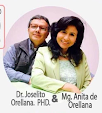Ecuadorian Pastor Contributes to Newly Published Spanish Study Bible
The Biblia de Estudio Mundo Hispano, published by Texas-based Editorial Mundo Hispano/Casa Bautista de Publicaciones
Two decades ago the corridors and patients’ rooms of a hospital in Quito served as Joselito Orellana’s pulpit, but a newly published Spanish study Bible promises to broaden his reach beyond Ecuador.
Orellana, now a pastor and seminary rector, once served as a chaplain at HCJB Global’s Hospital Vozandes-Quito (HVQ), leading Bible studies for staff, conducting chapel services in waiting areas and visiting patients to pray with them and their relatives.
During the last five years he has authored commentaries on the gospels of St. Matthew and St. Luke as part of the Biblia de Estudio Mundo Hispano, now available in bookstores. He was one of 57 Latin American theologians who contributed to the study Bible, published by Texas-based Editorial Mundo Hispano/Casa Bautista de Publicaciones (Hispanic World Publishers/Baptist Spanish Publishing House).
The greatest value of this study Bible, as Orellana sees it, is its basis in a Latino perspective. “It was published in the U.S. but with a Latin American mindset with learned authors from Latin America,” he said.
“The best commendation I could give to Joselito’s writing in the commentaries and in the notes he provided for the study Bible is that his work is purely Latino, not a translation of other scholars,” concurs David Sills, a former missionary to Ecuador with the Southern Baptist denomination. The two men, both with doctorates, worked together during the 1990s at the Seminario Teológico Bautista del Ecuador(Ecuadorian Baptist Theological Seminary) in Quito.
“He writes as a Latino to Latinos and publishes through Latino publishers, giving his work a welcome voice and powerful influence in the lives of Latin Americans,” Sills explained. “I’d like to see the study Bible used as a core resource for pastors throughout Latin America who are highly literate but have never had the opportunity for theological education.”
Sills later became rector of the Quito seminary, and he still returns for frequent seminars in Ecuador between semesters at the Southern Baptist Seminary in Louisville, Ky., where he teaches Christian missions and cultural anthropology.
Formerly, cultural anthropology “wasn’t always held in high regard. In fact, it was completely discounted,” Orellana told Duval Rueda on Apuntes Pastorales (Pastoral Notes) on Radio Station HCJB in Quito. “But in the world today, as well as within biblical research and in missiology, if you don’t study cultural anthropology you cannot understand the text.”
Orellana also employed such theological disciplines as exegesis (determining textual meaning), translating the original Greek language of the New Testament gospels. Biblical anthropology and archeology also served to bring a fresh perspective on the age-old books chronicling the birth, ministry, death and resurrection of Jesus Christ. To a lesser degree, Orellana touches on apologetics (defense of the gospel) because, as he told Rueda, “the Bible defends itself.”
Orellana described to Rueda three general categories of Bibles: a) paraphrased versions, b) dynamic translation using a dynamic equivalence of translated words and c) literal translations from the original languages. The new study Bible lands between dynamic and literal, according to Orellana. He offers his readers such study helps as color coding to indicate whether comments and notes come from translation (exegesis), cultural context investigations or other study areas.
“I have read through Joselito’s commentary on Luke—every single word of the biblical text and all of his comments—and I did it as a component of my quiet time (devotional study time),” offered Sills. “It is written in a devotional style, yet retains an academic feel by references to the original Greek, references to other scholars and so forth.”
HCJB Global’s Chuck Howard recalls taking students from the Alliance Academy International to help a church in the small town of Alluriquín where he met Orellana some 25 years ago. “Joselito was one of the promising young people in that church, and it was a joy to encourage him with both his music—he has a beautiful singing voice and plays the guitar well—and his preaching,” Howard said.
Several years afterwards, Roger Reimer, who formerly directed the mission’s healthcare ministries in Ecuador (including HVQ), saw in Orellana’s writing “a tool that I wanted to encourage as he wrote articles for hospital tract use that were clearly appropriate for the context of a hospital.”
Another former supervisor, David Kehrli, recalled that Orellana prepared sermon notes to accompany his message each time he preached at HVQ. “To this day I have those notes and I still use them,” said Kehrli, a pharmacist who serves on the pastoral team of a church in Racine, Wis. “I recognized that Joselito had a very high level of Bible learning.”
Orellana stays busy with responsibilities that range from preaching at Iglesia Bautista Universitaria (University Baptist Church) to seminary work were he presently is the rector. Frequently he hosts teams of U.S. seminarians accompanying Sills for hands-on experience in the mission field. His wife, Anita, accomplished in her own right with a university degree, and the couple’s daughters conduct Christian education seminars in Ecuador.
“He manages because he has a wife who shares his burden for ministry and submits to his leadership,” observed Sills. “His daughters understand that ministry is a family calling as well as their dad’s work.”
Commenting further on this balance between academia and praxis, Sills said of the Ecuadorian author, “He cares about writing as well as preaching. He could never do just one to the exclusion of the other without having a fire shut up in his bones.”


No comments:
Post a Comment